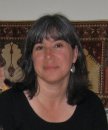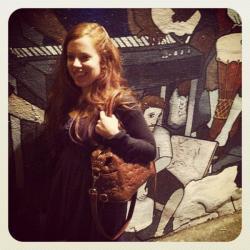- About Archives
- About SAA
- Careers
- Education
- Publications
- Advocacy
- Membership
VICE-CHAIR/CHAIR-ELECT (One Opening)

Ann Massman, MLIS, CA
University of New Mexico
Center for Southwest Research and Special Collections
Southwest Studies Librarian, Associate Professor
BIO: Kwe kwe. I am an archivist, Southwest studies librarian, and an associate professor at the Center for Southwest Research & Special Collections at the University of New Mexico. I am of the Algonquin First Nation (Ontario, Canada) on my father's side but have also lived my life primarily in the Southwestern U.S. As Head of Public Services for UNM's Center for Southwest Research, I work with Native American studies students, tribal community researchers, and academic scholars who come from across the region and the world to utilize our archival holdings on Native American activism, history and cultures. I have served NAAR on its steering committee for the last two years and am also representing our roundtable on SAA's new Diversity Committee which is now setting its sights on "diversifying the archival record." I am a member of the Academy of Certified Archivists, the Native American & Indigenous Studies Association, and a 1990 alumnus of the University of Texas at Austin MLIS and Archival Enterprise program. I have taught archival research for the Tribal Heritage project of the Association of Tribal Archives, Libraries, and Museums, and I am currently working on a book entitled “Navigating Archives: A Native North American Research Guide” to cover what researchers need to know for archival research in the U.S., Canada, and Mexico.
STATEMENT: I would like to continue the work of the Native American Archives Roundtable as NAAR moves forward from the foundational work of the Protocols for Native American Archival Materials. We need to keep those discussions and that momentum going. Extending from there we see significant numbers of new collaborative archival initiatives with tribal cultural centers, indigenous communities and non-Native archivists and archival institutions. NAAR has played a role in promotion and discussion of these initiatives and this is an important area for us. We should also play a leadership role in providing connections and education for those who are new to archives as well as our colleagues who are new to indigenous issues. I believe our roundtable has the responsibility of helping more Native archivists come into the profession, both mentoring and learning from them, as well as staying mindful of the indigenous communities we can be of service to. From the local we then must also be aware of what is happening internationally, to learn from our relatives and colleagues in other parts of the indigenous world. It is an exciting and challenging time to be working with Native archives in the digital age and Native issues in the age of the UN Declaration on the Rights of Indigenous Peoples. I would like to continue the work of NAAR and SAA in this indigenous "grassroots meets the world" collaborative approach that we have already laid the groundwork for.
Thomas Long
California State University San Bernardino
Associate Professor of History
Bio: I have a BA in history Sonoma State University, a MA in public history with an emphasis on Archives, Cal State University Fullerton and a PhD public history with an emphasis on Archives, from the University of California, Riverside. I am an Associate Professor of History, Public History Coordinator and Internship Coordinator at California State University San Bernardino, where I have been a member of the faculty since 2005.
Statement: In my capacities as both a history professor and archivist who teaches all of our courses in archival practices as well as develops our program through outreach in my role internship coordinator, I come into contact with a wide range of archives, both in the public as well as the private sectors as well as distinct sovereign California Indian Tribal archives and have learned more than I had ever thought possible, or even conceived of, about the wonderful world of archives. Perhaps the greatest lesson I have learned thus far is the remarkably significant role that collaboration plays in our fields of endeavor and how this great sharing process makes our careers more rewarding. As Vice-Chair, I would bring great enthusiasm, a dedication to the service that this post requires, and a firm belief in our open and sharing community of Archivists in all of our distinct fields of endeavor.
STEERING COMMITTEE (Two Openings)
 Leanda Gehegan
Leanda Gehegan
Charlotte Mecklenburg Library
Librarian
BIO:
Professional Experience: Librarian, Charlotte Mecklenburg Library, 2012-present. Reference Archivist, National Anthropological Archives, Smithsonian Institution, 2007-2011. Archives Technician, Harry Ransom Humanities Research Center, 2005-2007.
Education: M.S.I.S. with a Certificate of Advanced Study in the Preservation of the Cultural Record, School of Information, University of Texas at Austin. B.A. in Journalism with a Minor in Non-Violence Studies, Elon University
Professional Activities: Society of American Archivists Leader: Chair, Museum Archives Section 2011-2012. Speaker SAA 2012 “Archival Outreach through the Breath of Life Institute.” Poster co-presentation at American Anthropological Association conference 2011, Museum Anthropology section “From Field to File Folder to You: The Circulation of Information at the National Anthropological Archives.” Program Committee member, Mid-Atlantic Regional Archives conference 2011; Chaired MARAC 2011 session “Social Media Sensations: Creative Possibilities for Archives and Web 2.0.” Presentation at 2010 Smithsonian Archives Fair “Research Highlights at the National Anthropological Archives”
Statement: I welcome the opportunity to serve on the Steering Committee for the Native American Archives Roundtable. The Roundtable provides an opportunity to inspire and educate. As a member of the Steering Committee, I would work with members to educate the archival community about issues related to Native American archives and also build a support system for archivists working with these materials.
I was first introduced to the complexities and challenges of Native American archives at the Smithsonian’s National Anthropological Archives [NAA.] During my tenure at NAA, I relied on the Protocols for Native American Archival Materials to develop best practices for working with these collections. I also created guidelines for reference services and instruction curriculum for Native American communities. I’ve participated in different institutes focused on Native American archival collections such as the Breath of Life Archival Institute and programs for young Native American scholars. In my current position as a public librarian, I plan to develop programs focused on Native American history and/or literature.
Nick Pavlick
92nd Street Y New York City
Archivist
BIO: Nick Pavlik is the archivist for the 92nd Street Y, one of New York City's preeminent community and cultural institutions. He was previously a member of the project team for Uncovering the Secrets of Brooklyn's Nineteenth-Century Past: Creation to Consolidation, an archival survey project at the Brooklyn Historical Society that resulted in the creation of hundreds of online descriptive records for BHS's unique nineteenth-century archival collections. Additional positions include archival internships at the American Museum of Natural History and the New York Transit Museum. Nick will also serve as the 2012-2013 Programming Director for the Archivists Round Table of Metropolitan New York, in which he will oversee the planning and implementation of monthly public events highlighting current projects, professional trends, and prominent issues in the New York City archives community. Nick is a recent graduate of the Graduate School of Library and Information Studies at Queens College of the City University of New York, where he also received a certificate in archival studies. Beginning in the fall of 2012, he will be pursuing a second Master’s degree in Anthropology at Hunter College, where he intends to concentrate in Native American history and culture.
Statement: It is with great enthusiasm that I respectfully submit my self-nomination for a NAAR Steering Committee position. I have had a lifelong personal interest in the histories of Native North American cultures, and since entering the archives profession I have naturally sought ways to merge this interest with my professional career. Whether through writing research papers in graduate school on the complex legal and cultural issues at stake in the stewardship of Native American archival materials by non-Native institutions, attending sessions at regional and national archives conferences on implementing the Protocols for Native American Archival Materials, or following the work of scholars and professionals who are making significant contributions toward advancing awareness and respect of Native American archival issues, I have made a strong effort to remain current on the best professional and cultural practices lying at the forefront of this important area of archives management. I believe that one of the foremost responsibilities and challenges facing archivists today is ensuring the preservation of a culturally inclusive and representational historical record by actively engaging in the documentation of society’s underrepresented communities, especially as an increasingly globalized and technological world pushes these communities and their cultural traditions and knowledge systems further into the margins. I think that NAAR has done a tremendous job of advancing this imperative and demonstrating that archivists are uniquely situated to initiate mutually-beneficial and collaborative relationships with Native American communities that can result in sustainable frameworks for the safeguarding of Native American heritage, culture, and knowledge systems. If elected to the NAAR Steering Committee, I will avidly work toward continuing this goal, and will happily work with the Steering Committee to discover new ways in which we may serve the wider archives profession and advocate for the responsible documentation of Native American communities.
WEB LIAISON (One Opening)
Camille Tyndall
Southern Folklife Collection
Audio Technician
Bio: Camille Tyndall is an audio technician at the Southern Folklife Collection in Chapel Hill, NC. She graduated in the spring of 2012 from the School of Information and Library Science at the University of North Carolina at Chapel Hill with her MLS, with a concentration in archives and record management. As a student, she worked as an intern for the Forest History Society archives in Durham, NC, and the National Museum of the American Indian Archives Center in Suitland, MD, as well as working as a graduate assistant for the Southern Folklife Collection.
Statement: I believe that the NAAR's mission to educate archivists about Native American archival collections is extremely important, and that the roundtable's web presence is an essential part of furthering that mission. As a recently graduated student, and new archivist, I think that I can bring a new perspective to the position of web liaison, and I would embrace the opportunity to contribute to NAAR's mission.
NEWSLETTER COORDINATOR (One Opening)
No Nominations Received